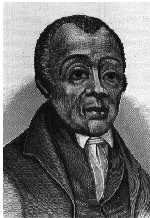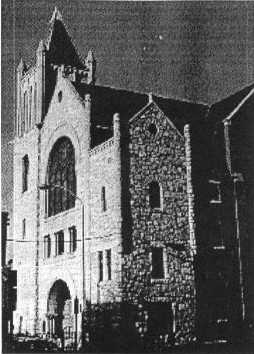|
|
|
The African Methodist
|
 |
|
|
|
The African Methodist
|
 |
This article first appeared in the February 1998 edition of Imani Tidings.
It
has been said that one who knows his/ her past has a good grasp of his/her future.
We learn and grow from both the vicarious and our own actual pasts.
It is
fitting that we recognize the founders of this great Church during the month of February,
the month where we recognize the collective history of people of African heritage.
At such a time as this, where we also remember one of the most heart wrenching episodes
of human history, that of American slavery, we must remember that the founder of
our church was himself a freed slave. Working diligently night and day, by the time
he was 20 he had bought both the freedom of himself and his brother for $2,000.00.
His Master was so moved by Richard Allen's Christian Spirit and his faith, he too
was converted to Christianity.
The African Methodist Episcopal Church is an
offspring of the Methodist Church founded by John Wesley in England and America in
the eighteenth century. The Methodist movement itself began in 1739 when John Wesley,
an Anglican, started a movement within the Church of England to improve the spiritual
life of his Church. The movement became widespread.
The genesis of the African
Methodist Episcopal (A.M.E.) Church, which today numbers over 2.5 million members
worldwide, can be traced to a clearing in the Delaware woods in the year 1777. To
that sylvan setting an itinerant Methodist preacher came, spreading the gospel to
a group of slaves, among whom was a 17 year-old field hand by the name of Richard
Allen.
When young Richard heard the Word he underwent a religious awakening.
Enslaved and recently severed from several members in his family, who were "sold
down the river" -- Allen took solace in his belief that hewould never be cut
off from God's love. The faith that took root in the forest that day would ultimtely
enable Richard Allen to establish what we now know of as the African Methodist Episcopal
Church. As members of the A.M.E. Church, our lives are inextricably linked to that
young slave by the name of Richard Allen. To use a familiar line from our Scriptures,
the half has never been told".
 |
|
Founder and First Bishop of the A.M.E. Church |
The formation of the A.M.E. Church is unique in that it is the first major religious
denomination in the Western world that originated over sociological rather than theological
beliefs and differences. The immediate cause of the organization of the A.M.E. Church
was the fact that members of the St. George's Methodist Episcopal Church in Philadelphia
PA, in 1787 segregated its "colored" members from its white congregants.
Black church members had been the most generous contributors of time and money to
help build a new gallery (balcony) in a building expansion program. What they did
not know was that the expanded upper gallery was targeted exclusively for the growing
black membership.
On a November Sunday in 1787, the first Sabbath service
after the church's renovations, the Blacks (including Richard Allen, Absalom Jones
and prominent black church member William White) were ushered to the new gallery
of the Church. As the church was called to pray, some of the Africans (as they were
called) knelt to pray outside of their segregated area. An altercation occurred.
Richard Allen looked up to find a church trustee trying to pull Absalom Jones to
his feet. An astonished Jones said to the trustee "Wait until the prayer is
over, and I will get up and trouble you no more." Then another trustee came
and tried to pull Mr. White from his knees. By then, the prayer was over and they
all "went out of the church in a body".
The organization of the
Free African Society was the initial results of this split and from this Society
came two groups: The Episcopalians and the Methodists. The leader of the Methodist
Group was Richard Allen. He desired to implement his conception of freedom of worship
and desired to be rid of the humiliation of segregation, especially in church. After
study and consultation, five churches came together in a General Convention which
met in Philadelphia, PA in April, 1816 and formed the African Methodist Episcopal
Church. The name African Methodist came naturally, as Negroes at that time were called
Africans and they followed the teaching of the Methodist Church as founded by John
Wesley. The young Church accepted the Methodist Doctrine and Discipline almost in
its entirety.
 |
Mother Bethel |
From "History of the A.M.E. Church ", WWW. AMENET. ORG, and "Historic Philadelphia: Mother Bethel A.M.E. Church www.libertynet.org/ihaftour/ bethel, html.
Copyright, 1999, Amanda Flipper A.M.E. Church. All rights reserved.
For questions
about this website, contact site administrator,
Rev. Rae D. Fitch, hamongirl@aol.com.